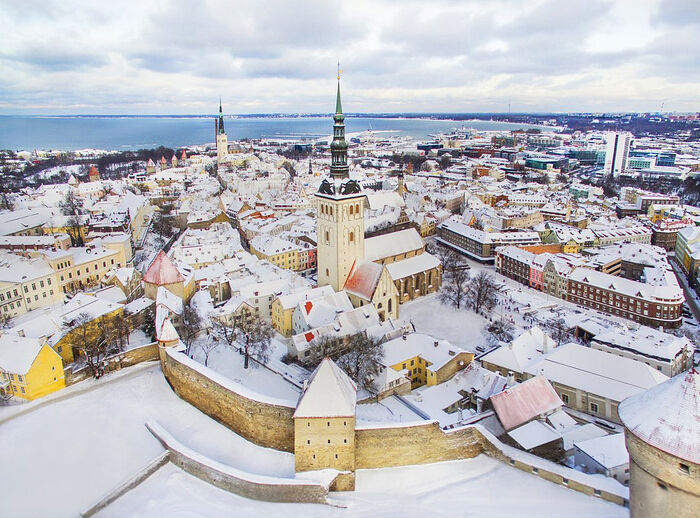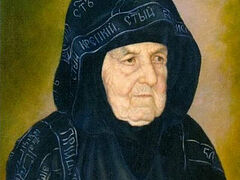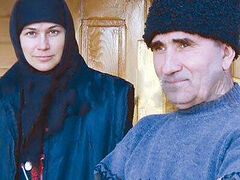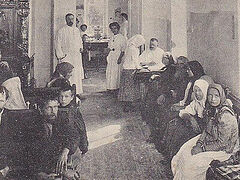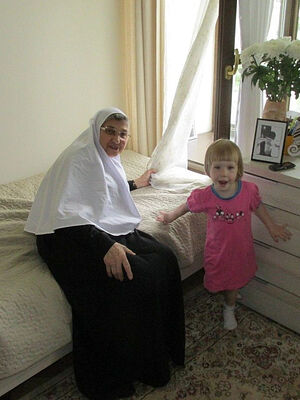 Nun Magdalene (Nekrasova) Winter school break was always a real challenge for my godmother: I used to visit her in Tallinn and stayed for whole two weeks. Frankly speaking, it wasn’t much fun, when I think about it now. Your so-to-speak godchild comes to stay in your house and, most importantly, stays for a while. Not only does he live with you, but he also wants to eat, demands attention, asks all sorts of questions, and even expects you to answer them—because, you know, he is getting smarter every day! Big trouble from every angle, overall! My godmother not only tolerated me; Nun Magdalene knew a lot about the benefits of humility, so she humbled herself. But she also loved me and so on the one hand she often humbled herself half-jokingly. On the other hand, she didn’t treat me as an annoying guest; she took my youthful quest seriously. But since her sense of humor was in good order, her ironic remarks about her godson’s intellectual and spiritual development stuck in my memory till these days. They still ring true today.
Nun Magdalene (Nekrasova) Winter school break was always a real challenge for my godmother: I used to visit her in Tallinn and stayed for whole two weeks. Frankly speaking, it wasn’t much fun, when I think about it now. Your so-to-speak godchild comes to stay in your house and, most importantly, stays for a while. Not only does he live with you, but he also wants to eat, demands attention, asks all sorts of questions, and even expects you to answer them—because, you know, he is getting smarter every day! Big trouble from every angle, overall! My godmother not only tolerated me; Nun Magdalene knew a lot about the benefits of humility, so she humbled herself. But she also loved me and so on the one hand she often humbled herself half-jokingly. On the other hand, she didn’t treat me as an annoying guest; she took my youthful quest seriously. But since her sense of humor was in good order, her ironic remarks about her godson’s intellectual and spiritual development stuck in my memory till these days. They still ring true today.
We lived during those good times when winters in Tallinn were white, really white (oh, and that smell of the burning stoves in the Old Town!), when the Nõmme district, where Nun Magdalene lived, resembled a good old fairy tale—soft snow enveloping the pine trees, the Church of St. John the Baptist across the street hidden under the blanket of snow – all this reminded me of the gentle world of Narnia. I had learned about Narnia from my godmother, as she never missed an opportunity to introduce me to good reads and new authors. We lived on Tähe (Starry) Street and I really hated its name: “What have these stars got to do with it?” I’d ask angrily. “It's almost like the stars on the Kremlin and I have my own accounts to settle with Communism!" As I recall, my godmother even had to sit down once she heard this. She definitely had a serious score to settle if anyone did. Her many years of exile in Central Asia, hunger, torture, persecution, and the death of her loved ones… It wasn’t until the end of the 1970s that she was able to move to relatively peaceful Estonia, but even here it wasn’t all smooth sailing either, of course. So, I noticed that despite all the terrible trials (and these stories are a good reason for many new articles to be written!), Nun Magdalene was able to preserve a kind attitude towards people, even those who caused this suffering. So, to put it mildly, she took my politically motivated wailing quite compassionately. “Well! You certainly got a good hammering,” she said smiling. And then she laughed. She said, "Have you ever thought that this star, the so-called 'tähe’, might remind us of another place?” “What other place?” I grumbled, all wound up with resentment, and moreover anti-communist—because as a formerly repressed person, my godmother, a nun, was the last person I would expect to hold such inconsistent views.
The Nativity of Christ is certainly once and forever, it’s not something that happens at a time strictly allotted in the calendar
“What if it’s about Bethlehem, for example?” she says. “By the way, the Nativity of Christ is once and forever, and not something that happens at a time strictly set in the calendar. It’s high time we forgave our enemies. Or think about how we can stop making new ones.”
Later that evening, as we left the church, Nun Magdalene took me to the parish house. Dyad’ka Mart, known as Fr. Juvenaly in our days, the rector of the Alexander Nevsky Cathedral in Vyshgorod, lived there at the time. He was a very young man at the time, but I still thought of him as a huge guy. And so he worked as a church groundskeeper. Whether you want to or not, have to respect him! I had a newfound respect for him when, at my godmother’s request, he started teaching English—using the Chronicles of Narnia as a teaching tool. So, this same Juvenaly, as it turned out, knew a great deal about music and he would occasionally sit down at the pump organ and give miniature concerts, playing something of his own. I remember how we used to go for a walk and stood under the windows of the parish house, with pine trees all around us, the snow falling softly, the smoke rising from the stove, and the music of Dyad’ka Juvenaly, that really sweeps you off your feet, uplifts you, and elevates your soul. So, there you are, standing there, and then it suddenly dawns on you: Well, by George, there are certain things more important than some “accounts” of yours, “politics” or something like “righteous anger.” Next, I turn around, and I see that my godmother has long since returned to her house on Tähe, for she is such a tactful lady! She was a woman with noble upbringing, tested by Soviet exile and prison!
I learned a good lesson, from both my godmother and Juvenaly the groundskeeper. Now, many years later, I remember the lesson only too well: It’s pointless to feel hatred. That music still resounds in my mind, along with my godmother’s words. I wish for all of us to hear this kind and bright music in our time, which is just as bad as it was then.

